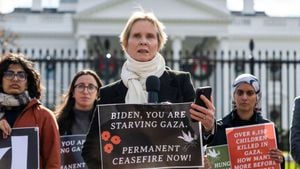New Zealand made headlines for its aggressive response to the Covid-19 pandemic, which included strict lockdowns and vaccine mandates. Now, the Royal Commission of Inquiry has presented its initial findings on this history-making decision, asking whether the methods used were effective or unnecessarily divisive. The comprehensive inquiry has sparked discussions about the government's decisions during the global health crisis and what lessons can be learned for future pandemic preparedness.
The findings, spanned over 713 pages and include 39 specific recommendations aimed at ensuring New Zealand is well-prepared for any future outbreaks. The inquiry's findings stressed several key aspects, including the strategic decisions taken, the healthcare system's response, and the significant societal impacts of those responses.
The report recognized the elimination strategy as effective in controlling the spread of the virus, contributing to some of the lowest Covid mortality rates globally. Yet, the approach significantly impacted various aspects of life and governance. The stringent measures imposed raised questions about the trade-offs between public health and individual freedoms. It was noted during the inquiry sessions, “the use of compulsion was one of the most controversial aspects of the Covid-19 response.” Such mandates, especially concerning vaccinations, have divided communities and strained trust between the public and government.
Interestingly, the inquiry mentioned how the government’s decisions were informed by the information available at the time, stating it was “reasonable” to enforce vaccine mandates for occupations where the risk of transmission was high, such as health and border workers. But as the Omicron variant emerged, some mandates were deemed overly broad and counterproductive as they began to cause harm—financial and social—to families and individuals during already challenging times.
Another point of contention discussed was the delivery and efficiency of information during the pandemic. Although early communication strategies were hailed as effective, the transition away from the stringent elimination efforts was poorly communicated. The report noted, “the transition out of the elimination strategy was not well signaled,” leading to confusion and unrest among the public.
The inquiry also highlighted issues related to economic measures. While New Zealand’s economic response initially received praise for preventing mass unemployment, discrepancies soon became apparent. The wage subsidy scheme, which cost taxpayers billions, was criticized for offering support to businesses regardless of their actual need, resulting in overpayments and frayed accountability.
Critics pointed out these very measures did not trickle down as intended, amplifying existing inequalities, especially among Māori and Pacific communities who were hit harder economically during the pandemic.
The inquiry’s findings foresaw drastic consequences for social cohesion, indicating, “the use of mandatory measures affected trust and social cohesion… likely to have far-reaching social consequences.” The report’s authors are particularly concerned about the lasting impacts of the civil unrest observed during the anti-vaccine and anti-mandate protests held at Parliament, labeling it unprecedented for New Zealand.
It’s worth noting the inquiry’s scope has not gone unchanged, with two phases established to keep the investigation focused. The first phase examined the overall response, but it explicitly avoided delving deep within the government’s decision-making processes—an aspect some have criticized as limiting the inquiry’s thoroughness. Phase Two has recently been announced, which will take the examination of vaccine mandates and socio-economic impacts to the next level through public hearings.
Professor Tony Blakely, one of the inquiry's key figures, identified several lessons from the report, such as the need for improved health infrastructure and communication strategies. He concluded, “The government showed it could perform well under crisis; it needs to build toward sustainable systems for the next threat.”
The findings have also empowered calls for reforms within the healthcare sector, pushing for more extensive public health capacity and efficient planning processes to maximize response options for high-stakes situations like the one posed by Covid-19.
The inquiry underscored just how rapid and extensive the pandemic response required was. Nearly 13,000 public submissions were made to gather insights from the community, marking the inquiry as comprehensively grounded not just on expert opinion, but public experience and values, enhancing its urgency for actionable change.
Looking forward, the recommendations have prompted fresh discussions on governmental responsibilities and the importance of learning from past mistakes. Cuts to public health capacities at this juncture could jeopardize New Zealand's ability to deal with future outbreaks and response strategies, placing both public health and societal trust at risk. Indeed, one of the report's most pressing calls urges for immediate action and designated leadership for its recommendations to be implemented effectively.
The government now stands at a crossroads, needing to balance these recommendations against its economic policies and public sentiment. Considering the state of global health threats, stakeholders agree one takeaway is clear: the window for preparation is narrow, and decisive, anticipatory action is necessary to build the health system New Zealand needs for the future.
With renewed dialogue on vaccine mandates, economic support, public health, and social cohesion, the Royal Commission's report serves not only as a reflection on the past but as groundwork for resiliency, urging leaders and citizens alike to face uncertain futures unified and prepared.



